#lanusse
Explore tagged Tumblr posts
Text
Cuando el amor se desvanece
En el fondo de un corazón herido y cansado, está la sombra de lo que una vez fue un amor brillante y apasionado. Ahora, me encuentro tratando de entender lo que ya no tiene sentido comprender.
Dices que estás desesperado por entender, pero ¿qué hay realmente para entender cuando un amor se desvanece con el tiempo? ¿Qué secretos quedan por descubrir en un sentimiento que ha perdido su chispa?
Cada pregunta se siente como un golpe, recordándome lo que alguna vez pensé que sería para siempre. Pero la realidad me golpea como una tormenta, llevándose las ilusiones que construimos juntos.
Ya no hay respuestas que valgan la pena buscar, solo el vacío de lo que alguna vez fue nuestra conexión. Las palabras desaparecen en el aire, dejando un silencio pesado que ahoga cualquier esperanza.
Aceptar la verdad duele, pero es un dolor necesario para sanar. Acepto que lo que creímos indestructible se desmorona entre mis manos, como arena escapando de un reloj roto.
Entonces, mientras tú intentas entender lo que ya no tiene sentido, yo me doy cuenta de que algunas cosas simplemente no tienen explicación. Y en medio de este dolor, la verdadera comprensión tal vez radique en dejar ir lo que ya no merece nuestra atención.

#desamor#corazón roto#reflexión#desilusión#tristeza#aceptacion#cambio#superacion#amor perdido#sabiduria#notas tristes#frases y pensamientos#status facebook#frases#pensamientos#imagenes con texto#para dedicar#sentimientos#amor#holaxat#xathola#cartas de amor#cartas de desamor#carta de despedida#daniela#danielalanusse#daniela lanusse#lanusse#cherry#cherry2021
88 notes
·
View notes
Text

Mgr Lanusse in the School of Saint-Cyr, western suburbs of Paris
French vintage postcard
#the school of saint-cyr#sepia#photography#vintage#suburbs#mgr lanusse#postkaart#paris#ansichtskarte#ephemera#carte postale#postcard#postal#western#school#briefkaart#photo#saint#lanusse#tarjeta#historic#french#postkarte
2 notes
·
View notes
Note
Don't tell my friend that I did not sleep immediately (she will scold me XD). But what is Napoleon and Junot about? Gib their interactions, their history, the tension, their secrets, what you thought about them, what is good and bad about them, headcanons, some things that you love about them, anything that will save my curiosity before I go to sleep in 4:30 am 👀
That is all. Have a nice day/evening 😌
HELLO!! sorry for my late reply I have the cold and I was figuring how to write this without sounding too crazy 😭😭 thank you @whatever-whatsoever for reminding me to check my inbox 🤩 YESSS NAPJUNO ASK!!!! THANK YOU ❤️❤️ I'll have to give a super abbreviated version because they had so much history *sniff* 🥺
I may yap more about my personal head canons and why I love them in a separate post hehehe👅
disclaimer: I don't claim to be objective or an historian as this is very napjuno-biased :P English is not my first language so there will be many grammatical mistakes😭
I feel like I should first mention that Napoleon and Junot had a long history of correspondence throughout their lifetime. And Junot kept every. single. letter Napoleon wrote to him. Unfortunately none of these letters exist anymore because Napoleon sent a lackey to have them burned the moment Junot committed suicide. (I WILL NEVER FORGIVE NAPS FOR THIS 😭) so most of what we know about their relationship is secondhand from Junot's wife, Laure Junot's (Duchesse d'Abrantes) memoirs. She's also not the most reliable person so it's possible she might heavily exaggerated on some stuff
As for the letters, it's always been up for debate why Napoleon wanted them gone but my personal headcanon is they must've been written in a very romantic tone... and Napoleon was so heavily trying to suppress his feelings for Junot and burning those letters was a way of burying their relationship once and for all
OKAY, SO A BRIEF HISTORY ON NAPJUNO!!
Junot's fated meeting with Napoleon began in 1793! He was already promoted to a segreant when they met and Napoleon was already a General at the age of 24(!). It was during the Siege of Toulon that Naps had asked for someone who had beautiful handwriting to dictate a letter and Junot volunteered to write what he dictated before a cannon fire sprayed it with dirt. Naps was so impressed by his coolness that he made Junot his secretary and Aide-de-camp, and soon they'd become inseparable
soon after Toulon, Napoleon was accused of treason for his connections to Augustin Robespierre and was jailed. Junot , of course freaking out about this wrote him letter to offer an escape but Naps declined.
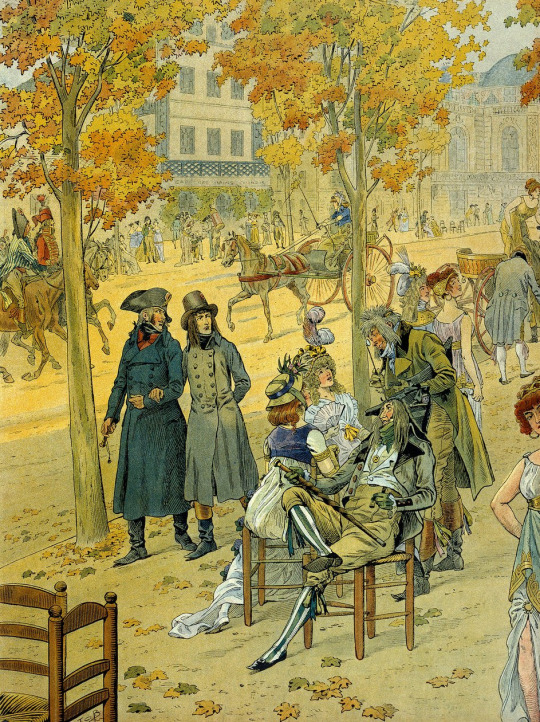
^ this illustration by Jacques Onfoy de Bréville represents one of their "leisure moments" together circa 1794-95
so after a little while Napoleon got married and found his fortune, Junot continued to follow him to his legendary Italian and Egyptian campaigns. In Egypt, he was promoted to General but he was actually not too happy with this since this means he'll be away from Napoleon often. There's also this famous (or infamous?) incident where he challenged General Lanusse to a duel ,simply because he opposed Napoleon's leadership , with this words :
«We must fight; it is essential that only one of us survive. I hate you because you hate the man that I love and admire as much as God, if not more»
sounds like a chivalric romance doesn't it? :3 It was also during this campaign there were rumours within the army comparing Naps and Junot to "Hadrian and Antinous" . of course Junot does nothing to dispel those rumours 🤓 Poor guy got wounded in the stomach and Naps didn't visit him until the last minute.
Napoleon wasn't able to take Junot with him when he left Egypt and by the time Junot made it back to France in 1800, Napoleon was already First Consul and the power differences between them already put a strain on their relationship. This was further exacerbated once Naps became Emperor.
When Naps sent Junot to Portugal , he wrote a bunch of desperate letters begging him to reappoint him as his aide-de-camp again and Napoleon once confronted to Junot's wife about the letters he wrote to him (I'm like 99% sure it probably sounded more romantic than the ones he wrote to her) . it got to the point that Laure Junot ahd to admit that Junot possibly loved Napoleon more than her and their children.
Junot was often sent away from Napoleon during from like c. 1806-1810ish? and didn't interact much except by correspondence (I think) I'm going to skip over the Portugal /Spain period
Okay so by the Russian Campaign of 1812, Junot pretty much fell out of favour from Naps and the consequences of Junot's actions almost completely destroyed their relationship. By this time period, Junot's mental and physical health was very, very fragile from his campaigns in Portugal & Spain and Napoleon was no longer the Napoleon he knew back in their youth. Napoleon was furious and even shamed him on the military bulletin. Junot was devastated at this and the thought of losing Napoleon's friendship was unbearable after 20 years of being devoted to him.
After he returned to France from Russia, there are several anecdotes mentioning how he would wanderlessly mutter out loud that “The Emperor no longer loves me” in his apartments😭 Napoleon's love for him was all that mattered😭😭💔
There's this scene where Duroc (Napoleon's Grand Marshal of the Palace) and another friend visited Junot to comfort him and this happened:
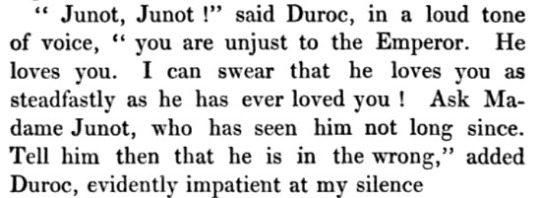
Junot obviously didn't believe the Emperor still loved him of course💔

Soon after spending some time resting and with his family, he was appointed Governor of Illyria. (I think Naps sent him there because he wanted him out of France but Idk). His insanity finally set in and there's this infamous incident where Junot attended the ball completely naked except for his medals and hat and his battle wounds were on full display...
Soon after that, he had to be forcefully be sent back to his father's home in Montbard. It was there where he committed suicide by jumping out the window.
💔
Junot's last letter to Napoleon is heartbreaking by the way....
“I who love you with the affection of a savage for the sun, I who am entirely yours. Well then: This eternal war that we must fight for you, I WANT NO MORE OF IT! I WANT PEACE! I want finally to repose my tired head, my sore limbs … to enjoy that which I earned … with my BLOOD! The blood of an honest man, of a good Frenchman, of a true patriot. I therefore ask, at last, for that tranquility that I earned through twenty-two years of effective service and seventeen wounds from which my blood has flowed for my country, and for your glory.
Like I mentioned in the beginning, soon after the news of Junot's demise reached the public, Napoleon immediately sent someone to his house in Paris where his wife and brother-in-law were at and forcibly searched through Junot’s home to seize and burn his letters.
Oh yeah there's more but I'll leave it at that for now </3 LIKE WHAT THE HELL NAPS WHY DID YOU BURN THE LETTERS 😭😭Like they must've been fucking crazy man,,, omg sorry this keeps me up at night 😭
they make me so

Junot's ending was sooo tragic.... he was definitely a Greek tragedy-esque figure😢 He possibly died believing Napoleon hated him when that wasn't the case. Napoleon, despite reprimanding Junot very harshly for Junot's actions (non-actions?) during the Russian campaign, he still had a soft spot for him.
I also think of like how his life would've been better without meeting Napoleon. But also thinking again how much Junot treasured his meeting with Napoleon.... ough they're so painful sdkjskdljdhljhdjfhdkjhfdj excuse me while I combust
NapJuno was basically like painful unrequited love slow burn over 2 decades . Or maybe it wasn't completely unrequited? I like to think Napoleon was in denial and constantly tried to suppress his feelings for Junot 😔😔😔 anyway Junot was so delulu... (he's my precious delulu cat) he kept hoping Napoleon would still love him like he used too pre-Emperor days. Of course those days will never come back. I guess he was always living in the past while Naps moved on 🥲💔
well even if Napoleon doesn't love him at least I do 😤
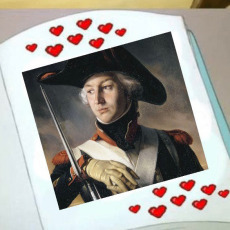
as my friend @ promises-of-paradise once said, I think Junot was almost definitely romantically obsessed with Napoleon. Like actual romantic love (I'm not even being delusional this is what I truly believe). Whether they actually did anything together is up for debate, but it’s clear that Junot’s feelings for Naps were a lot more intense than a regular friendship.
also I highly recommend reading these posts regarding Junot and NapJuno's relationship:
The NapJuno bible of course: https://erenow.org/modern/napoleonic-friendship-military-fraternity-intimacy-and-sexuality/4.php
BTW THERE'S A NAPJUNO RPF WRITTEN AND PUBLISHED IN A FRENCH MAGAZINE BACK IN 1926!!!! I JUST NEED TO FIND THE LINK (it's also in French)
and Laure Junot's memoirs! it's available on the internet and she (and imo rightfully) suggests Napoleon and Junot were possibly incredibly intimate during their broke days. Girl was the OG napjuno shipper istg
~~
If any of my fellow NapJuno fanatics want to add info about them more please do so!!! I'm probably forgetting some stuff 😭
53 notes
·
View notes
Text
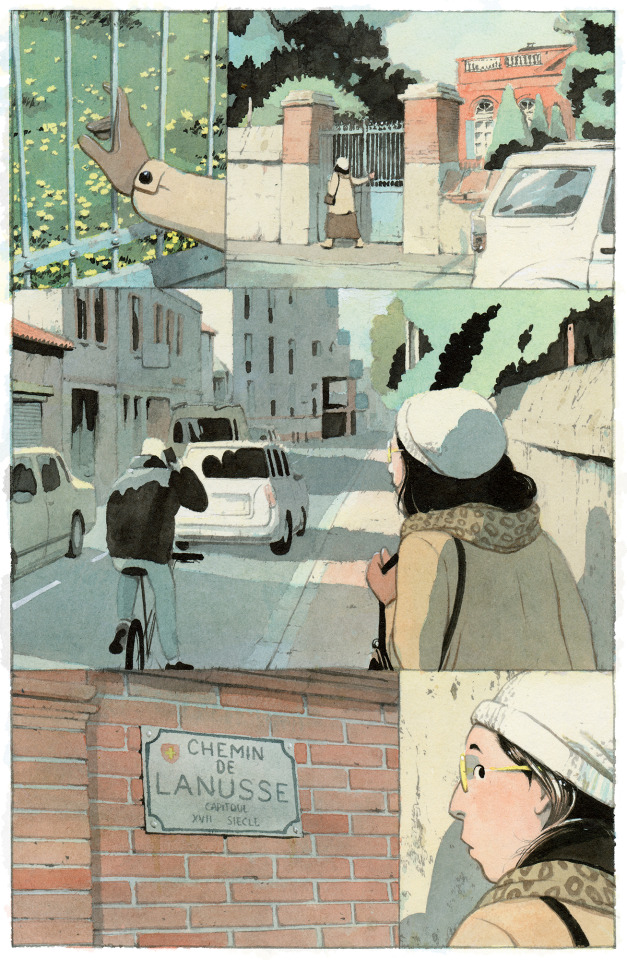
Chemin de Lanusse, Toulouse
103 notes
·
View notes
Text
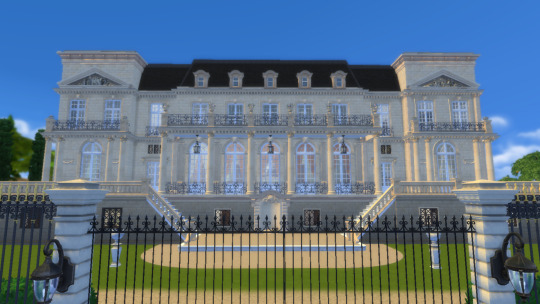
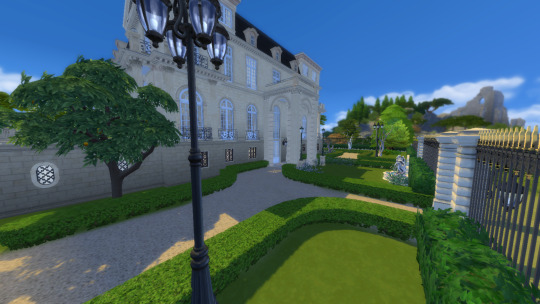
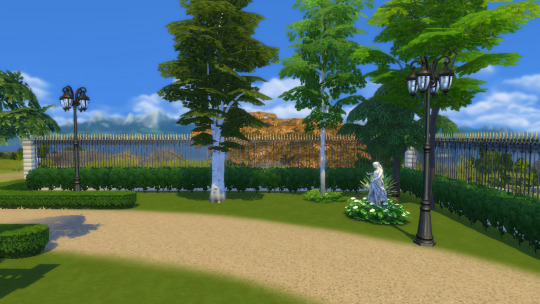
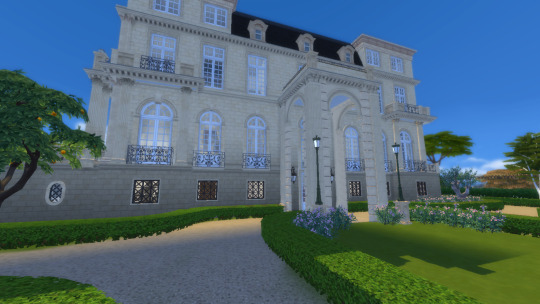
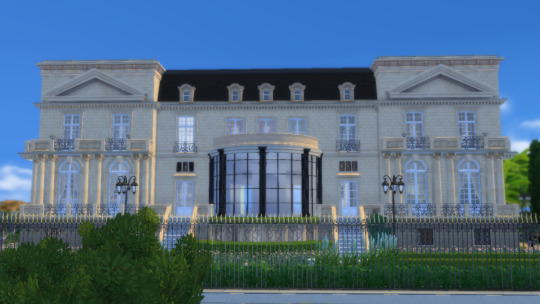
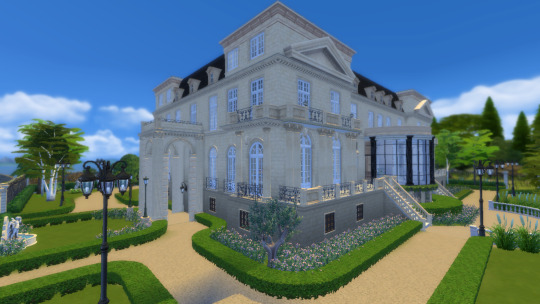
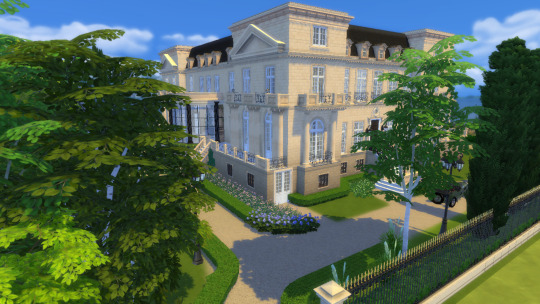
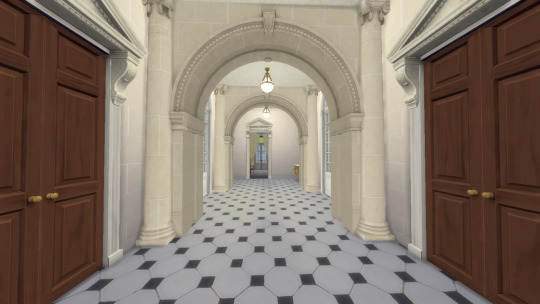
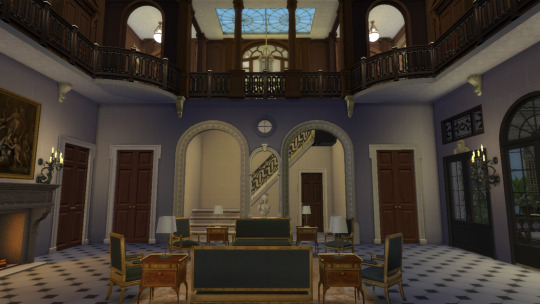
Sans Souci Palace
Hi gouys! This is the Sans Souci Palace, located in Buenos Aires, Argentina.
This house is set to be in a 64x64 Lot. You will need all cc from The Jim, Felixandre, SYB, Marble Mortal, GSsims, etc. It is the usual content I use for my houses.
I made the third floor but it is not completed. In fact, the residence does not have this 3rd floor, but the roof looked weird w/o it.
Some history:
The Sans Souci Palace, located in Victoria, is undoubtedly one of the architectural landmarks not only of San Fernando but also of the northern region. This December marks 100 years since its official inauguration. Its history is intertwined with the history of the neighborhood, and its construction marked a turning point in the urban vision of the district's waterfront.
To briefly recount its history, we can go back to 1911 when the Alvear siblings, Carlos María, Josefina, and Elisa, married to Mercedes Elortondo, Matías Errázuriz, and Ernesto Bosch, respectively, traveled to Paris, France, in search of an architect to design their residences on the embankments of the area. The three couples chose the trendy architect of the time: René Sergent, considered the best in neoclassical and Versailles-style architecture.
The French architect also built the Bosch Palace in Buenos Aires, which serves as the official residence of the United States ambassador, and the Errázuriz Palace, now the Museum of Decorative Arts. The Sans Souci palace, owned by Carlos María de Alvear and his family, was the last of the three projects to be designed.
In 1914, the builders Eduardo Lanús and Pablo Hary laid the foundation stone of the Palace on the land inherited by Alvear's wife in Victoria, San Fernando. In December 1918, it was officially inaugurated.
Its four facades are made of imitation stone. The stairs are made of Paris marble, while the rest of the details and finishes, although they appear to be genuine, are imitations. The imitation marble was created by Swiss craftsmen from the Italian canton who were specialists in this technique. All the carpentry in the Sans Souci Palace was made of Slavonian oak. The doors were painted to imitate the wood grain, giving them identical marks.
The gardens, which initially covered 9 hectares, were designed by the French landscape architect Carlos Thays. During the construction of the Palace, Alvear tried to buy the neighboring property belonging to the Lanusse family with the intention of demolishing it and expanding his garden. However, the Lanusse family never agreed, so a huge wall was built. Thays not only organized the garden but also planted a group of trees to hide the large wall, making it appear as though the house extended further.
(From https://www.quepasaweb.com.ar/100-anos-palacio-sans-souci-san-fernando/)
DOWNLOAD HERE: patreon.com/user?u=75230453
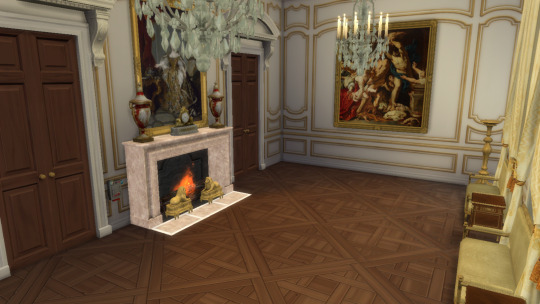
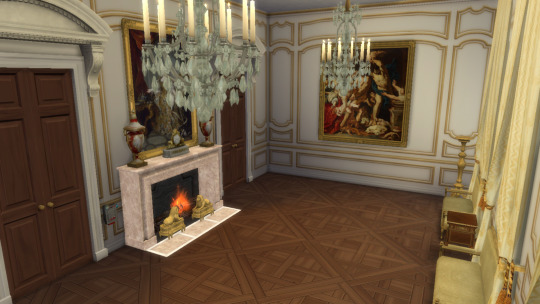
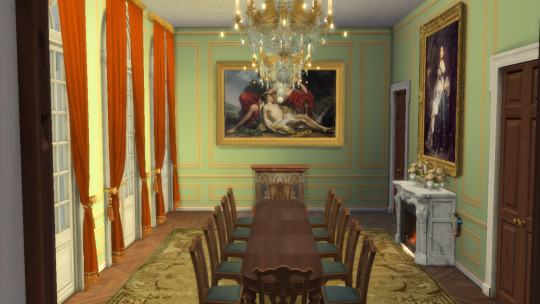
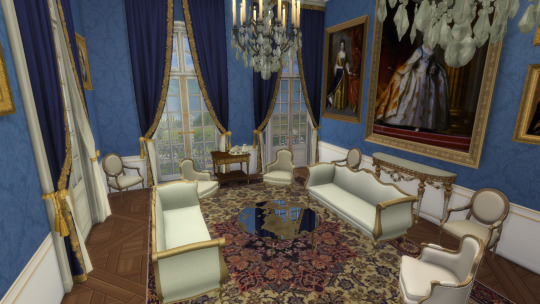
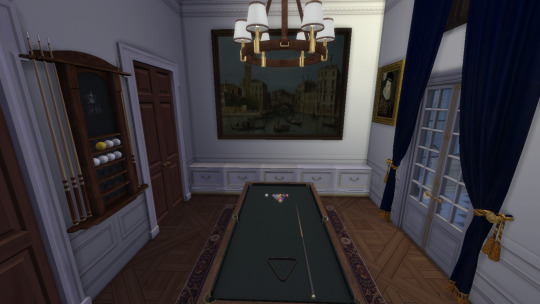
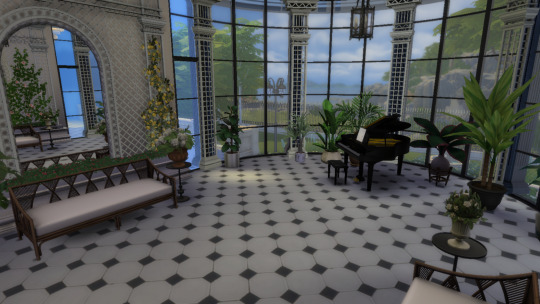
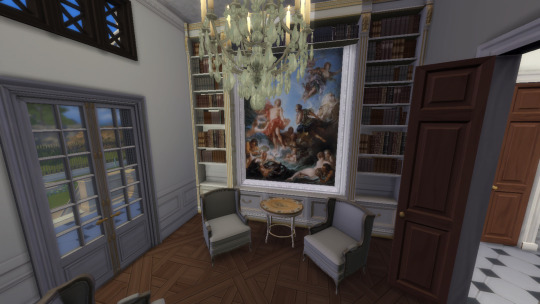
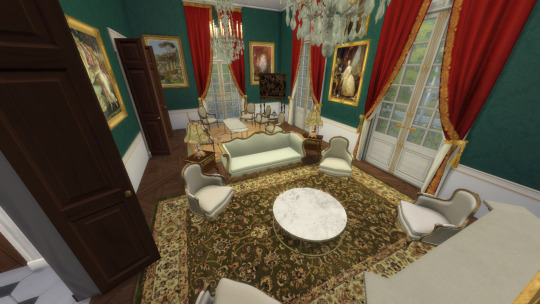
#sims 4 architecture#sims 4 build#sims4palace#sims4#sims 4 screenshots#sims4play#sims 4 historical#sims4building#sims 4 royalty#sims4frencharchitecture#ts4#ts4 build#ts4 screenshots#the sims 4#sims 4
41 notes
·
View notes
Text
Susi Newborn — one of the most skilled and effective activists in Greenpeace’s 52-year history — passed away on the last day of December 2023. She is remembered fondly by her beloved children, Brenna, Woody, and Naawie; her granddaughter Toody; by her ex-husbands, Martini Gotje and Luc Tutugoro; and by friends, colleagues, and shipmates around the world.
In 1977, when Susi arrived in Canada for her first Greenpeace action, to protect infant harp seal pups in Newfoundland, she was already something of a legend. Journalistic tradition would have me refer to her as “Newborn,” a name that rang with significance, but I can only think of her as Susi, the tough, smart activist from London.
Susi was born in London in 1950, from Argentine parents. Her mother had grown up among the Buenos Aires elite and knew famous artists such as Raul Soldi and Mexican muralist Don Sequeiros. Susi’s godmother was a founding member of the Campaign for Nuclear Disarmament (CND) in the UK, and a colleague of Bertrand Russell. Susi grew up meeting writers, philosophers, and artists.
Susi’s father was an Argentine Embassy diplomat, whom she described as “a deeply spiritual man.” He told her about meeting Mahatma Gandhi and urged her to “work for peace.” At the age of five, she stopped her father from chopping down a tree near their London home, her first ecology action, and in 1970, at the age of 20, she attended the world’s first Earth Day protest in London’s Trafalgar Square.
Argentina at the time suffered under a series of military dictators, and Susi’s father quietly opposed the Junta headed by General Alejandro Agustín Lanusse. When her father died, the tragedy radicalised her and she embarked “on a personal journey of activism.”
Hosting the film star
Susi worked for Friends of the Earth in London for two years, and in the summer of 1975 she attended the International Whaling Commission (IWC) meeting in London, where she met Greenpeace members Paul and Linda Spong. Greenpeace Foundation in Canada had spent two years planning our first global ecology action, after protesting US and French nuclear weapons tests for four years. We were tracking Russian whalers off the coast of California in a fishing boat, and our campaign depended on confronting the whalers during this London IWC meeting.
Paul and Linda Spong informed Susi about the planned confrontation, and she helped organise London ecologists and media for the coming drama. In June, two days before the IWC meeting would close, we located and blockaded the whalers. The next day, we announced the confrontation by marine radio; and Susi, Paul, Linda, Greenpeace filmmaker Michael Chechik, and a team of activists stormed the IWC meeting with the news.
In 1976, Susi met Greenpeace co-founder Bob Hunter in London. Hunter returned to Vancouver with tales of “the amazing Susi Newborn” in London. He called her “a hard-core, grassroots ecologist who could help lead the next generation of Greenpeace actions in Europe.” Six months later, she arrived in Canada to participate in a campaign to halt the slaughter of infant seals on the Labrador ice floes. Susi told me that the direct action tactics and Earthy spiritual style of Greenpeace appealed to her.
In May 1977, Susi pitched her tent on icy Belle Isle, 32 kilometres off the coast of Labrador, surrounded by ice floes, awaiting the arrival of the Norwegian sealing ships. Susi and David “Walrus” Garrick explored frozen caves and wrote a “Declaration of Freelandsea,” a free-spirited manifesto of ecology.
Three days after Susi and the Greenpeace team pitched camp on the ice, French actress Brigitte Bardot arrived to help bring attention to the Norwegian infant seal slaughter. Bardot wrote in her account that she had been “terrified” flying through a storm in the helicopter, and she arrived at the camp stifling tears and clutching her frozen fingers under her arms. Susi made her a cup of hot chocolate, warmed her in the tent, and explained practical tips such as how a woman could pee at night on frozen Belle Isle. “They give me courage,” Bardot wrote in her journal.
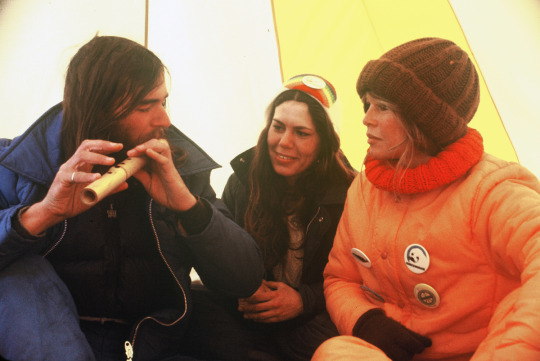
Rainbow Warrior
Back in London, Susi next wanted to disrupt Icelandic whaling. She recruited Denise Bell from Friends of the Earth and set out to find a boat to confront the whalers in the North Atlantic. I sent her a file of photographs from the nuclear, whale, and seal campaigns. Like us in Canada, Susi had no money. She started fundraising, using Michael Chechik’s documentary film of the first two whale voyages, which was aired on the BBC with an introduction by British naturalist David Attenborough. Susi and Denise met Charles Hutchinson from London and Allan Thornton from Canada, and the group opened the first Greenpeace office in the UK at 47 Whitehall Street. Simultaneously, French activist Rémi Parmentier and Canadian David McTaggart opened another office in Paris, where they were protesting French nuclear testing in the South Pacific.
Susi and Denise Bell scoured maritime journals, looking for ships for sale. On the Isle of Dogs, in the Thames Docklands, they found a rusting, diesel-electric, 134-foot trawler that had been converted to a research ship by the Ministry of Agriculture, Fisheries, and Food. The Sir William Hardy was available to the highest bidder. Charles Hutchinson introduced them to the manager at Lloyds of Pall Mall bank. They received a bank loan, secured by the life insurance policies of Hutchinson and Bell. The Department of Trade accepted their bid of £42,725, and they put down a 10 percent deposit, £4,272, on the ship. This was the first ship that Greenpeace actually owned, and Susi sent us photographs of the sad looking trawler that within a decade would become one of the most famous ships of the 20th century.
Newborn, Bell, and an army of volunteers cleaned the ship, stem to stern. Susi recruited her childhood friend Athel von Koettlitz and Australian boyfriend Chris Robinson to tackle the restoration. They clambered down into the pitch-black engine room with a flashlight. The hovel was a rust bucket, and the 800-horsepower engine had not been fired in years. They wiped moisture off gauge glass, tightened loose fittings, and got the two-stroke diesel engine running. Susi and the team removed trawling gear, scraped off rust, painted the ship, and shopped for second-hand parts.
In the fall of 1977, they negotiated with the Ministry to reduce the final price of the Sir William Hardy to £32,500, about £182,000 today. To raise this money, they toured Europe with the documentary, The Voyage to Save the Whales. In the Netherlands, the World Wildlife Fund financed a fundraising campaign. Bob and Bobbi Hunter departed for Amsterdam to accept the money for Greenpeace. On the way, they stopped in London to see the new ship, and there Bob Hunter gave Susi a copy of Warriors of the Rainbow, a book that had inspired Greenpeace in Canada, with a prophecy about how all the people of world — people of the rainbow — would come together to save the Earth from ruin. The crew later agreed to rename the ship Rainbow Warrior. The crew added rainbows to the ship’s deep green hull, a white dove copied from the book cover, and painted Rainbow Warrior at the bow, the vessel’s glorious new name.
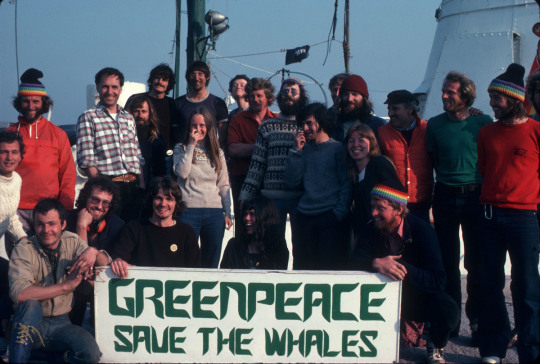
Whales and nuclear waste
Susi saw Greenpeace as an integration of ecology, the Gandhian satyagraha she had learned from her father, Quaker direct action, and a deep respect for Indigenous Earth-informed spirituality. She was naturally inclusive and realised that the hard-edged punks of London appreciated ecology as much as the hippies, peace activists, and affluent conservationists. She recruited nuclear campaigner Peter Wilkinson, who had grown up around the South London docks, and had good relations with the dockworker unions, whom he convinced to “turn a blind eye” to the non-union Greenpeace team working on the ship. Susi built alliances with everyone. “Our gut reactions to injustice are the same,” she told her colleagues.
By January 1978, the Rainbow Warrior was ready for its first ecological campaign, and on 2 May, they slipped down the Thames and into the North Sea. The seasoned crew included skipper Nick Hill; chief mate Jon Castle; Peter Bouquet, a mate off a tanker; cameraman Tony Mariner; and Von Koettlitz assisting Chief engineer Simon Hollander. Devonshire nurse Sally Austin served as medic, Hilari Anderson from New Zealand as cook. Bob Hunter and Fred Easton joined the crew from the Greenpeace Foundation in Canada. Remi Parmentier and David McTaggart joined from the Paris office; and Bell, Hutchinson, Thornton and Susi Newborn form the UK core of the crew. Others came from Holland, Scotland, South Africa, Switzerland, and Australia.
Crowds welcomed the ecologists in Calais, Amsterdam, Hamburg, and Aarhus, Denmark, where Susi and the crew showed films from earlier Greenpeace missions. Greenpeace organisations emerged in some of these cities. Susi understood that to spread the ideas of peace and ecology we needed to not only take action, but also build the movement itself.
The Rainbow Warrior crew confronted Icelandic whalers, then put into Reykjavik to release film to the media. Pete Wilkinson joined the crew in the UK and told Susi he had found evidence that the European nuclear industry was dumping radioactive waste into the Bay of Biscay, off Spain. The crew decided to expose the toxic dumping scheme, and pushed south. They would soon blow the lid off one of Britain’s nastiest secrets.
At Falmouth Bay, Susi and Denise Bell returned to London to issue media releases and handle inquiries. Easton and Mariner travelled north to Sharpness, where the nuclear dumping ship Gem sat in port, loading large drums labelled: RADIOACTIVE WASTE.
Later, off the coast of Spain, the Rainbow Warrior interrupted the dumping. A 600-pound drum dropped from the Gem and flipped a Zodiac, throwing Gijs Thieme into the water, as the film crew captured the event. Later, in London, Susi and the European media teams released the film and photographs and organised a debate with nuclear industry representatives on the BBC. The activists revealed that each year, approximately 80 kilograms of plutonium-239 had been dropped into the Atlantic trench. In a few weeks, the Rainbow Warrior team had opened a new era of scrutiny for the entire European nuclear industry.
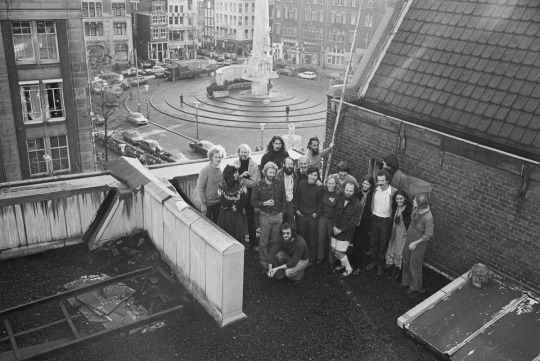
Greenpeace International
For the summer of 1979, Susi and the London activists organised new confrontations with the Icelandic whalers and the nuclear garbage scow Gem. Susi, the alliance builder, offered the Rainbow Warrior to Amnesty International, CND, Greenpeace New Zealand, and to other activists for campaigns. When crews returned from campaigns, Susi later told the New Zealand Dominion Post, “it’s like they’ve been to a war zone. You feel like you’ve gone to some bloody killing field somewhere.” In 2015, she recalled, “I still have injuries from those experiences.”
As Greenpeace became more famous, power struggles naturally arose, and in 1979, Susi fled London to get away from the conflicts. She retreated to the Greek island of Samos, but didn’t rest for long. In Ayios Konstantinos, she heard from fishermen about an annual massacre of Aegean monk seals in the Mediterranean. In her typical fashion, Susi organised “Greenpeace Aegean Sea,” recruited young environmentalist William Johnson, launched a monk seal crusade, and made an alliance with Dr. Keith Ronald from Guelph University in Canada, who brought in the World Wildlife Fund. The ad hoc group successfully ended the marine mammal massacre.
I next met Susi in November 1979, when we gathered in Amsterdam to create an International Greenpeace Council to coordinate the fast-growing organisation. Susi arrived on the Rainbow Warrior with Jon Castle, Tony Mariner, Athel von Koettlitz, Pete Wilkinson, and others from Europe. The council included representatives from Canada, UK, US, France, Denmark, and the Netherlands. New Zealand, Denmark, Australia and Germany joined soon thereafter, and Greenpeace now operates in 55 countries.
Susi was a fearless activist, more interested in the ecological vision of Greenpeace than in organisational manoeuvring or who would have power. During the week in Amsterdam, I met with her frequently, and the talk was always about our next actions and what we might achieve with Greenpeace tactics. Susi was the real deal, an activist to admire and emulate.
Kia ora
Susi moved to the US and received a degree in Human Ecology from the College of the Atlantic in Maine. In 1985, in New Zealand, during a campaign to stop French nuclear tests at Moruroa Atoll in the South Pacific, the French Secret Service bombed the ship Susi had loved and laboured over. The bombing broke her heart. “Not in a month of Sundays,” she said, “would I ever have expected a major European country to blow up a peace boat.”
In 1986, she moved to New Zealand (Aotearoa), where she stayed active in ecology and justice campaigns. In 2003, her Rainbow Warrior memoir A Bonfire in My Mouth was published by HarperCollins.
In New Zealand, in the 1990s, Susi served on the Board of Greenpeace New Zealand. She worked for Oxfam as their climate campaigner, for the NZ Refugee Council, and for the film union. Susi was a poet and a grand storyteller. She loved to talk about her days with Greenpeace and the importance of nonviolent direct action in changing our world for the better.
In the late 1990s, she moved to Waiheke and remained active in campaigns from protecting sensitive ecological regions to supporting Palestinian civil rights. In 2014, Susi helped create a Climate Voter initiative, encouraging New Zealanders to use their vote to make change. The following year, she joined her friend, Greenpeace Aotearoa executive director Bunny McDiarmid, in a march to stop deep sea oil drilling in the region.
In 2022, Susi began treatment for breast cancer. “I know there is something in the world that is creating a giant cancerous tumour,” she said at the time, “that is tearing us apart, commodifying the air we breathe and the water we drink. I also know that this tumour is interspersed with flowers and song birds and the salty waters of the tears we shed.”
Susi Newborn passed away on 31 December 2023, at the age of 73. The Maori community of Waiheke hosted a memorial for her at Piritahi Marae on Waiheke Island, on the tribal lands of the Ngāpuhi and Ngāti Paoa Māori people. Piritahi means, fittingly, “coming together as one.” The community gave her a tangi, a Māori farewell. Friends who worked and sailed and battled with Susi over 50 years, attended and offered fond memories.
“Susi, had a strong sense of injustice,” said McDiarmid, “and never gave up hope it was possible to make change in the world. She believed in the strength of people to make change. She was also really funny, clever and incredibly good company.”
“Susi was brave and fearless,” said her friend Bianca Ranson, “but that was balanced with her kindness and her generosity. Susi showed us how to be fearless and brave and calculating. She taught us how to keep ourselves safe while pushing the line as hard as we could. What she was doing decades ago, if only people had taken that seriously then we’d be in a very different situation now. She was a pillar, a pou, of the island community. What are we supposed to do without her?”
“What I loved in the early Greenpeace years was the feeling that anything could happen anytime, anywhere,” wrote Rainbow Warrior photographer Pierre Gleizes Nicéphore. “On board, life was never dull, and Susi was part of that story from day one.”
“Susi and I have been the best of mates since we met in 77,” said former Rainbow Warrior cook, Hilari Anderson. She called Susi “a feisty sister Warrior.”
I corresponded with Susi and spoke with her by phone many times while she was in New Zealand. She always signed off with “Kia Ora,” a Māori greeting of wellbeing that means “have life.”
Indeed. Kia Ora, dear Susi.
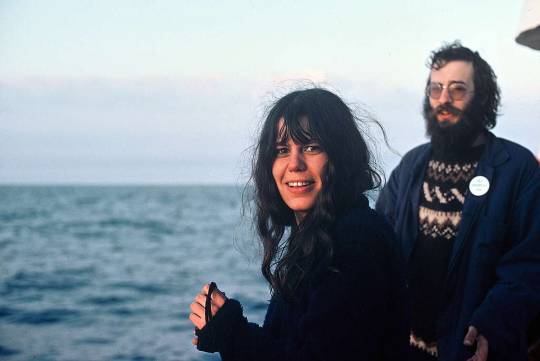
2 notes
·
View notes
Video
youtube
🗣️ ALEJANDRO AGUSTÍN LANUSSE ⚖️ en el Juicio a las Juntas Militares- Año...
0 notes
Text
The Chilling Truth: Antarctica Just Lost an Ice Mass the Size of My Country
Antarctica’s sea ice is not just a local phenomenon — it plays a significant role in regulating the Earth’s temperature. Ricky Lanusse 6 Aug 23 “………………………….Recent reports from July 30th, 2023, reveal that Antarctica has lost a mass of ice the size of my country, Argentina, the 8th largest country in the world. And this profound loss is sending shockwaves through the global community. The…
View On WordPress
0 notes
Text
0 notes
Text
Donde cada rincón cuenta una historia y cada sombra guarda un secreto.
¿Quieres conocer mis monstruos? 🖤 Te advierto que no hay héroes ni cuentos de hadas aquí, solo sombras que bailan en mi mente 🕷️✨. Mis demonios no piden permiso; gritan, susurran y a veces hasta me arrancan una carcajada 😈.
Este caos no lo esconde un disfraz, porque soy yo, sin filtro ni excusas 💭💔. Si decides quedarte, cruza tu corazón y prepárate para perderte conmigo 💫. Bienvenida a mi la-la-lado oscuro 🌑, donde cada rincón cuenta una historia 📚 y cada sombra guarda un secreto 🤫.

#ladoocuro#sombras#misterio#caos#caos emocional#reflexión#monstruos#oscuridad#autenticidad#viajealdesconocido#sentimientososcuros#sentimientos#sombrayluz#holaxat#xathola#daniela#lanusse#danielalanusse#cherry#frases y pensamientos#status facebook#para pensar#pensamentos aleatórios#frases amor#cartas de amor#escritos
10 notes
·
View notes
Text
El hallazgo del cadáver de Aramburu: 5 heridas de bala, la confesión de Montoneros y el misterio del noveno asesino
Tras la ocupación de La Calera el 17 de julio de 1970 se pudo encontrar el cadáver del general Aramburu e identificar a los miembros de la naciente organización armada “Montoneros” que lo mataron. Las cartas de Paladino a Perón, que negaba la participación del peronismo en el secuestro. Las acusaciones contra Onganía hasta lograr su renuncia y las diferencias entre Livingstone y Lanusse PorJuan…
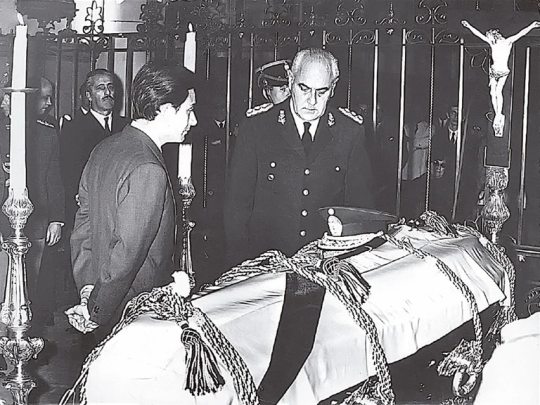
View On WordPress
#17 de julio de 1970#5 heridas de bala#Autor Juan Bautista Yofre#cadaver#Confesión de Montoneros#Gral Aramburu#infobae#La Calera#Noveno asesino
0 notes
Text
VOTE @general-junot !! I've never written propaganda for this before but here I go
Jean Andoche Junot was known as "The Tempest" for his passionate bouts of anger and impulsive life-style. He was a gambler and alcoholic and was very charismatic. Here's an excerpt about Junot:
"He present excellent extemporary speeches and composed poetry, which Junot's future wife wrote was quite good. He also had a quick wit and was considered a good comedian. He could dance, act, and draw as well. Combined with his good looks, easy demeanor, and his free hand with wine, Junot was often the life of a party"

Sample of Junot's handwriting ^
Napoleon Bonaparte met Junot at the battle of Toulon when Naps needed someone to write and deliver a letter in the midst of battle, Junot excitedly volunteered. As he was writing the letter a shell hit the ground close to the two of them but Junot didn't flinch. He made a joke about how the impact of the shell made it so he didn't have to wait for the ink to dry. His composure while under fire impressed Napoleon.
After Toulon, Napoleon was unemployed and lived with Junot and Marmont at a hotel. Junot was the breadwinner! Andoche's parents would send him money and he would make more money by gambling. And they were roommates (oh my god they were roommates)
"these ambitious young men relied on each other during their impecunious days in Paris. Describing how Junot 'loved Bonaparte as one loves at the age', Laure Junot implies that the young Jean-Andoche developed an adolescent crush on Napoleon, as the two young men grew in intimacy."
They went on garden dates together! (I still can't believe this was real, it reads like a fanfic)
"They plunged into the shadows where they found the air heavy with the perfume of thousands of blooming rosebushes that filled the flowerbeds... the two friends walked slowly, silently holding each other by the arm, squeezing each other’s arms from time to time, as if to consult the heart and respond. At this moment, the two friends were much closer … speaking to one another, heart to heart, they were then much closer the one to the other than they have ever been since."
Anyways he challenged a guy to a duel at Egypt because he insulted Napoleon too much. (he has a habit of challenging people to duels)
"Despite Bonaparte’s strict prohibition of dueling among his officers, Junot challenged Brigadier General Pierre Lanusse to a duel on the banks of the Nile in 1799 because of Lanusse’s open disapproval of Napoleon’s leadership. Addressing his opponent, Junot reportedly said, 'We must fight; it is essential that only one of us survive. I hate you because you hate the man that I love and admire as much as God, if not more'" ... "Both Lanusse and Junot were seriously wounded with saber lacerations to the face and chest. Napoleon was reportedly furious, but was said to have later remarked, 'My poor Junot … wounded for me!'” 🏳️🌈🏳️🌈🏳️🌈 !!
Ok I can't find the exact point where he did this buy he killed six guys all by himself one battle.
Anyways after Egypt he was kidnapped by Horatio Nelson and got upset so Andoche chucked someone overboard and the British thought he was so badass that they gave him a gift basket of fruit.
As time went on, he started to become more mentally unstable. Napoleon realized this and started to distance himself from Junot and put him in lesser-positions. This drove him to madness as historians often say about him.
Junot was heavily devoted to Napoleon to the point of insanity, he loved him "with the affection of a savage for the sun" (yes he wrote that himself). The Russian campaign was devastating for him and he was desperate to win back Napoleon.
"At a ball at Ragusa ... [Junot] arrived stark naked except for his epaulettes, gloves, dancing shoes, orders and decorations"
"In this ballsy ballroom display, Junot presented his disfigured body as bitter proof of his lifelong devotion to a man whom he once loved, for whom he frequently risked his life ... the scarred body that astonished the Illyrian ladies that evening was the body of a battered lover who had sacrificed his youth and vitality to a violent and abusive man ... Junot’s cerebral trauma symbolized the degenerative effects of rampant Napoleonic madness."
He spiraled into despair because of his love for Napoleon. If anyone deserves to continue through this tournament it should be the man who devoted his life and body to Napoleon.
Liberté, Égalité, Homosexualité! Vote Jean-Andoche Junot!

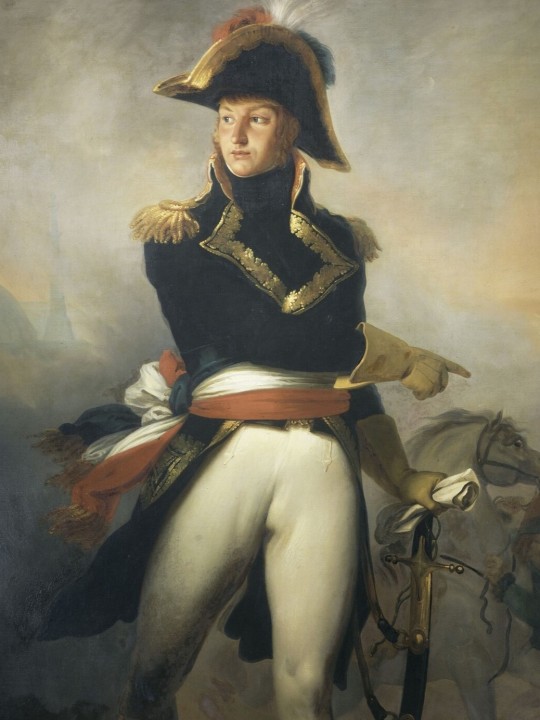
Arthur O'Connor:
a. “He was noted to be attractive when he was alive + was extremely vain about his appearance to the point where some people found it annoying. The British press was obsessed with him but even Gillray often drew him to be hot.”
Jean-Andoche Junot:
a. “Napoleon's mentally ill bestie who basically fell in love with Napoleon (please he had such a tragic life and death that he deserves to win the sexyman tournament as compensation)”
b. “THE HAIR DEAR LORD THE HAIR…”
#jean andoche junot#napoleonic sexyman tournament#napoleonic sexyman#general junot#propaganda#sexyman propaganda#junot propaganda#long post#long text post#napoleonic era#napoleon's generals
94 notes
·
View notes
Text
Rumble in the opposite of a Jungle
The Junot-Lanusse duel. From « Le Général Junot en Égypte » by Dubief. My translation after the French.

Au sein de l'armée se trouvait un noyau de frondeurs qui grondaient contre Bonaparte. Kléber, Murat et Lanusse étaient les plus enragés. Junot, lui, au contraire, demeurait fidèle à son chef et lui gardait une entière confiance. Il souffrait beaucoup de ces dissensions, mais restait neutre.
Pourtant, il était un général qu'il ne supportait pas, et qui le lui rendait bien : c'était Lanusse. Celui-ci montrait un caractère très dur, parfois jusqu'à la férocité ce qui ne pouvait qu'irriter Junot.
Tout le quartier-général subissait les éclats de cette vive haine. Alors, Murat, dans une bonne intention, comme cela lui arrivait parfois, invita les deux antagonistes à un dîner de réconciliation avec d'autres officiers, dont Bessières et Lannes. Le repas se déroula dans une atmosphère plutôt détendue. Puis ils entamèrent une partie de bouillotte. Malheureusement, la conversation, qui jusqu'à présent était restée dans une vague neutralité, aborda le délicat sujet de la situation de l'armée sur les terres d'Égypte. Bessières, prudent, prêchait la patience.
Mais, l'impétueux Lanusse, ne laissa pas passer l'occasion de critiquer vivement et en termes crus la politique menée par Bonaparte. Junot, muet, sentait la colère battre à ses tempes. Lanusse, l'observant, lui demanda alors brusquement :
- Junot, prête-moi dix louis : je suis décavé ! - Je n'ai pas d'argent devant moi. Et il jouait du bout des doigts avec une pile de pièces d'or. - Comment dois-je prendre ta réponse ! - Comme il te plaira. - Je t'ai demandé si tu voulais me prêter dix louis de l'argent que tu as devant toi. - Et moi, je te réponds que j'ai bien de l'argent devant moi mais qu'il n'y en a pas pour un traître comme toi. - Il n'y a qu'un … qui puisse se servir d'un pareil mot.
Les chaises renversées, tout le monde se leva. Brouhaha, bousculades, on s'interposa, le silence revint et Junot reprit :
- Ecoute, Lanusse, je t'ai dit que tu étais un traître je n'en crois rien. Tu m'as dit que j'étais un …, tu n'en crois rien non plus, car nous sommes tous deux de braves gens. Mais, vois-tu, il faut que nous nous battions. Il faut que l'un de nous y reste. Je te hais parce que tu hais l'homme que j'aime et que j'admire à l'égal de Dieu même, si ce n'est plus. Battons-nous et tout de suite. Je jure de ne me coucher ce soir qu'après avoir vidé cette affaire.
Le duel, bien qu'il fut en honneur à l'armée, avait été strictement interdit par Bonaparte. Il fallait donc se cacher. Rien de plus facile: le jardin de Murat s'étendait jusqu'au bord du Nil. Neuf heures du soir. On alluma des torches.
- Quelle arme prendrons-nous ? demanda Junot. - Belle question, le pistolet ! » répondit Lanusse.
Tous les officiers pâlirent, l'adresse de Junot au pistolet était pourtant célèbre: il transperçait, à vingt-cinq pas, un as en plein milieu.
- Je ne me battrai pas au pistolet avec toi, répondit-il, tu ne sais pas tirer. Tu ne mettrais pas dans une porte cochère. La partie doit être égale entre nous. Nous avons nos sabres. Marchons.
Ils descendirent vers le fleuve, à la lueur tremblante des torches. Bessières s'approcha de Junot et lui murmura à l'oreille : Tu as fait une sottise ! Lanusse est très fort à l'espadon !.
Et Murat, oubliant l'objet de ce repas, de dire : Songe donc que lorsqu'on se bat c'est au fait pour tuer son homme !
Quant à Lanusse, il ne cessait d'outrager le nom du général en chef, si bien que Junot lui cria : On dirait que tu veux te monter la tête !.
- [LANNES à LANUSSE] Tais– toi. C'est fini, que diable ! Vous allez vous couper la gorge, qu'est-ce que tu veux de plus ? Tout ce que tu lui diras à présent, c'est du luxe ! « .
L'inondation du Nil avait rendu le terrain inégal : mauvaises conditions pour un duel.
- Si c'était de jour encore ! s'écria Murat, mais vous ne pouvez vous battre là ! - Allons donc ! répliqua Junot. C'est un enfantillage !
Ils jetèrent leurs habits, tirèrent leurs sabres.
A quelques pas, attentifs, les témoins discutaient des chances des adversaires. Junot attaqua et d'un coup trancha le haut du chapeau de Lanusse, le bouton d'uniforme qui attachait la ganse. Sans ce providentiel chapeau, Lanusse qui a senti sur sa joue le froid de la lame, serait mort, prompt à la riposte et profitant de l'instant où Junot s'était découvert, il lui porta un coup de revers qui lui fendit le ventre. Junot tomba. Ses camarades se saisirent de lui et le transportèrent dans la salle à manger, parmi les bouteilles, les cartes à jouer, les pièces d'or.
Quand Bonaparte apprit la nouvelle, il entra dans une vive colère :
- Quoi ? ils vont s'égorger entre eux ! disait-il à Desgenettes. N'ont-ils pas assez des Arabes, de la peste et des Mamelucks ! Ce Junot, il mériterait les arrêts pendant un mois !
Et, tandis que Junot se morfondait au lit, attendant que sa plaie se cicatrisât (longue de huit pouces !) Bonaparte refusait d'aller le visiter, tout en avouant :
- Mon pauvre Junot, blessé pour moi ! Aussi l'imbécile, pourquoi ne s'est-il pas battu au pistolet ?
--------
At the heart of the Army was a pit of rebels who railed constantly against Bonaparte. Kléber, Murat, and Lanusse were the most fervent. On the contrary, Junot, for his part, remained loyal to his commander, and maintained the most perfect faith in him. He tolerated the grumbles, but remained neutral.
That being said, there was one general up with whom he could no longer put ??? he really couldn’t stand, and who returned the sentiment : Lanusse. Lanusse had a firm character, to the point of cruel ferocity, which could do nothing but irritate Junot.
The general staff indulged his outbursts of insistent hatred. And so Murat - in one of his well-intentioned gestures - invited the two antagonists to a conciliatory dinner with some of the other officers, among them Bessières and Lannes. The meal passed more or less calmly, but then moved on to a game of cards, at which point the conversation - nice enough up to now - broached the delicate subject of the army’s presence in Egypt. Bessières, prudently, suggested a certain patience. But Lanusse, impetuous as he was, wouldn’t leave the opportunity to critique Bonaparte’s politics, and in no uncertain terms. Junot, mute before him, could feel rage throbbing at his temples. Lanusse, seeing him, demanded brusquely :
- Junot, lend me 10 Louis : I’m fresh out ! - I haven’t got any money, he replied, running the tips of his fingers over a pile of gold coins. - And how should I take your response ? - However you like. - I asked if you might lend me 10 Louis from that pile you’ve got there. - And I’ll tell you that I have got some money before me, but not for a traitor like you. - Nobody but a *#$%@ would use a word like that.
Chairs were overturned, everybody was on their feet. Mayhem, a sort fo free-for-all, and then someone came between them. Calm returned and then Junot was back at it.
- Listen, Lanusse, I told you you were a traitor, and I don’t believe it. And you called me a *#$%@ … and you don’t really mean that either ; we’re both brave fellows. But, don’t you see, we have to fight. Only one of us can remain standing. I hate you because you hate the man I love and admire as much as God himself, if not more. Let’s get to it, then. I swear not to go to bed tonight until I’ve dealt with this affair, one way or another.
The duel - as a practice - had been forbidden by Bonaparte (even in the good name of the Army). They would have to go about it in secret. Nothing could be easier - Murat’s garden backed up to the Nile. Nine in the evening. They lit the lanterns.
- The weapon ? asked Junot. - Good question. Pistols ! answered Lanusse.
The assembled officers paled - Junot was famously good with a pistol, a crack-shot ; he could hit an ace in the middle of the card at 25 paces.
- I won’t fight with pistols against you, he countered, you don’t know how to shoot. Don’t get yourself into something you can only regret. It’s got to be equal between us. We have our sabres. Now march.
They made their way down to the river, in the quivering light of the torches. Bessières came up to Junot and whispered in his ear : You’re making a mistake! Lanusse is devilishly good with a blade !
And Murat, forgetting the point of the dinner, added : Remember that, when you fight, it’s to put an end to your man !
As for Lanusse, he never ceased to spit on the name of Bonaparte, to the point that Junot cried,
- Now you’re just getting worked up ! - [LANNES to LANUSSE] Shut up. It’s over, by God ! You’re already going to slit each others’ throats, what more do you want ? Anything more you have to say to him is just thrown away.
The flooding of the Nile had made the terrain irregular underfoot : poor conditions for a duel.
- If there were still some daylight, cried Murat, but you can’t fight here ! - Come on ! replied Junot, this is childishness !
They took off their coats, drew their swords.
A few paces back, apprehensive, the seconds discussed the chances of the two adversaries. Junot attacked, landing a blow to the top of Lanusse’s hat, cutting the button which attached the braid. Without this God-sent hat, Lanusse - who had felt the cold of steel across his cheek - would be dead, but as it was, he was quick to riposte, and taking advantage of the moment which had left Junot unguarded, he countered with a back-cut that slit open his opponent’s abdomen. Junot fell. His comrades gathered him up and brought him into the dining room, among the bottles, the playing cards, and the gold coins.
When Bonaparte heard the news, he flew into a rage :
- What ?? Are they really going to gut each other ? he asked Desgenettes, Haven’t they had enough of the Arabs, the plague, and the Mameluks ? This Junot deserves to be put away for a month !
And while Junot, bored and confined to his bed, waited for the wound to heal (eight inches long !) Bonaparte refused to visit him, even as he confessed :
- My poor Junot, hurt like this for me ! Also, what an idiot, why would he refuse the pistols ?
75 notes
·
View notes
Photo


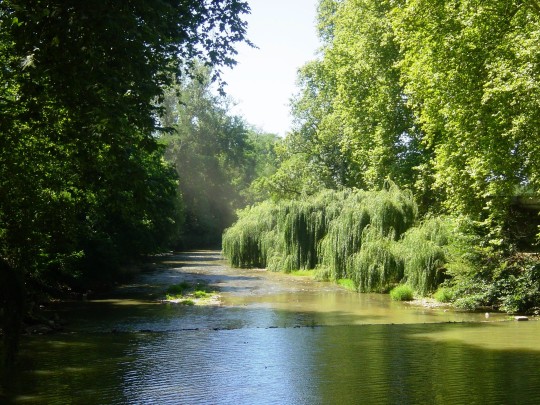
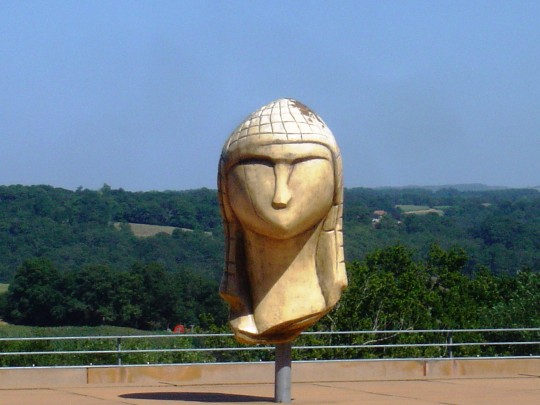
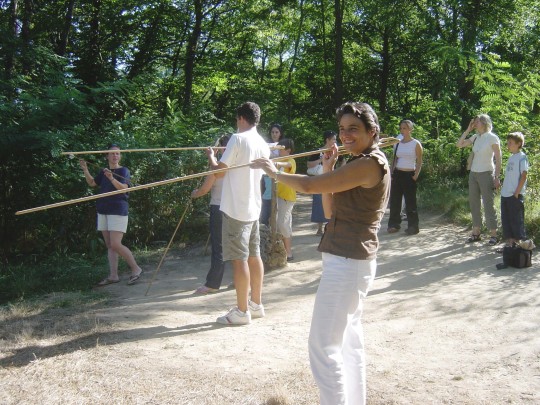

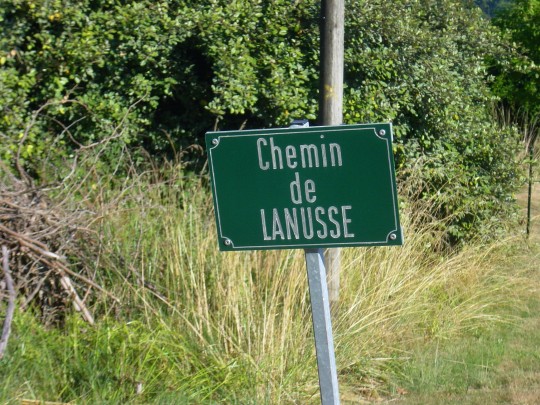
Je reprends mon projet de présenter la plupart de mes 52461 photos (oui, ça a encore augmenté !).
2005. Juillet chez Christine
- les 3 premières : Amou, dans les Landes, traversé par le Luy. Il y a des arènes
- les 3 suivantes : Brassempouy, célèbre pour la paléolithique “Dame à la Capuche” , qui n’y est malheureusement plus... Non loin, des...autruches ??!!
- eh bien on finit par Lanusse... (oui, c’est un trou)
#souvenirs#landes#amou#arènes#luy#platane#brassempouy#dame de brassempouy#dame à la capuche#paléolithique#préhistoire#archéologie#autruche#lanusse
0 notes
Text
Warning: *This reblog really escalated*
Some of us should start working for HBO because they are the only ones I would trust with such a task. We would need a really long series which goes into as many details as possible. I don’t understand why HBO and a lot of other American shows only have like 10 episodes with 1 hour of content per episode but if we are going to go that route, this project will need like idk 10 seasons???
1. & 2. Season:
Start with Napoleon’s youth, put all the anecdotes and little stories we know about that time of his life. We need to meet his family, learn about his siblings, see his relationship to his parents.
Show him going to school, how he studies, his awkwardness, his brilliance, everything. We could have one little scene or shot in a scene of Davout who started his journey at the military school of Brienne right after Bonaparte.
Him dealing with his father’s death, him taking care of his younger siblings, him and Joseph being him and Joseph.
Show how he and his siblings deal with the start of the revolution and end the season (or not? It really depends on how every episode is structured and when what is shown) with Napoléon’s brilliant siege of Toulon. Suchet, Victor, Junot and Marmont were there as well, we need to meet them as well. These four also had their part in the Italian campaign.
His struggles after the siege of Toulon. Show him how he was imprisoned for 10 days in August 1794. Living with Junot. His months of unemployment before dealing with the royalist mob of 13th Vendémiaire. I believe future Marshal Brune was there as well? Meeting Murat. They would also have their roles in the Italian campaign. This combined with meeting his first wife Joséphine and marrying her before the start of the Italian campaign would make a great finale for the first season. This would also mean that we need to meet Désirée Clay (if not both Clary sisters because Joséph married in 1794).
We have to give the Italian campaign at least half of a season. Napoléon improving the state of the army of Italy. We would need to meet Augerau, Bernadotte, Berthier, Bessières, Duroc, Lannes, Masséna and Sérurier. Considering how the army of Italy was structured, generals La Harpe, Meynier, Macquard, Garnier and Stengel would be nice to see too? At least to mention them in one sentence. Lanusse would also be a nice detail (thank you, @diagnosed-anxiety-disorder for telling me about him)
I have no idea when Larrey finds his way to Napoléon but he is always loved and cherished and obviously part of all of this. In addition to that, it would be nice to see how…
…Bernadotte and Berthier clashed together
…Lannes forms his friendships with Victor and meets Napoléon at Dego, I believe.
…Murat and Bessières (so @flowwochair gets their BessiMu scenes) acted together and how Napoléon noticed Bessi and how Bessières got the command of “Les Guides de Bonaparte”
…people disliked Augerau’s and Brune’s lootings.
…Suchet performed in Italy brilliantly. I believe one of his friends died either in this campaign or in the siege of Toulon in his arms so having this moment, at the right time, would be nice.
…Masséna doing his night march. Show the good and bad parts of this campaign, the most important battles, the traits of the generals and also the looting the army itself did and how Napoléon failed to control and punish this type of behaviour. How Naps won three victories in four days and how he won the (4 years long?) war against Piedmont-Sardinia in around three weeks. Lodi. Milan’s reaction the French. Castiglione, Bassano, Arcole, Rivoli etc. Include the letters of Napoléon to Joséphine and how he felt because of her while she had fun with Hippolyte. As a teaser for the future marshals and important figures, let’s have Naps do a monologue about glory (at the proper moment ofc) while we see a scene with different soldiers and even politicians? Show Ney, Soult under Lefebvre, Bessi doing his thing in south of France before they are introduced. Give Desaix and Moreau one little moment. I have no idea what politicians like Fouché or Talleyrand did at that time of their lives but we could see them as well? The Bonapartes siblings. What ever suits the scene.
Egypt with “THE gang”. Berthier, Bessières, Davout, Desaix, Duroc, Junot, Lannes, Larrey, Marmont, Masséna, Murat, and idk who else. Eugène was even there. -> Malta -> Nile -> Cairo/Pyramids -> ??? (My knowledge about the Egyptian campaign is so little, pls, forgive me) -> Davout doesn’t have any fun because of dysentery. -> Nelson doing his thing and the French having a bad time -> Napoleon finds out that Joséphine cheats (I couldn’t find a date) -> Rosetta Stone ->Battle of Aboukir (25th July 1799) ; Duroc is badly wounded, Murat gets his jaw shot, Lannes making fun of Murat while recovering himself until Lannes finds out that his wife cheated (I have no idea if that’s the exact moment how Lannes found out but it would be a funny scene showing their interesting dynamic as rivals and friends) -> Battle of Alexandria (21st March 1801); this would be after the Brumaire coup so idk if it finds a place in all of this but it needs to be mentioned because if I understood correctly, this meant the end of the French influence in Egypt.
The 18th Brumaire coup. Could be the end of the second season. Could also be in the third season. It really depends on the structure of everything beforehand; it would make a great finale though.
AND I AM STOPPING NOW, BECAUSE MY BRAIN IS LIQUID.
Conclusion: I think this bubble would do an amazing job. Love you all. I hope you like this idea. C:
The Tumblr's own Napoleon movie
Okay, I don't usually post but at this point I'm so disappointed about Ridley Scott's Napoleon that I certainly think, the napoleonic fandom on Tumblr could make a historically more accurate film about the era. Who knows more about our beloved&hated historical figures or who is a bigger chaotic genius than the people of Tumblr? We should make our own movie as a protest. I mean, this was meant as a joke but seriously we should do it one day. Whether it's a historical drama, a comedy or even a musical - I think, even online, separately we could make a bigger blockbuster than that merde-dans-un-bas-de-soie. If there was a Napoleon 2002 (not the best one either), there should be a Napoleon 2023, too. I mean, a second one.
#napoleonic era#napoleon's marshals#i am not tagging all of them#napoleon bonaparte#What if we made a series
74 notes
·
View notes
Photo

Inauguration de la plaque commémorative en hommage de Monseigneur Lanusse au cimetière de Tonneins #tonneins #commemoration #inaugurationplaque #Lanusse #TonAttitude #çacesttonneins (à Ville de Tonneins) https://www.instagram.com/p/B21L6_xIgc6/?igshid=1skcxcfd4n1l6
0 notes